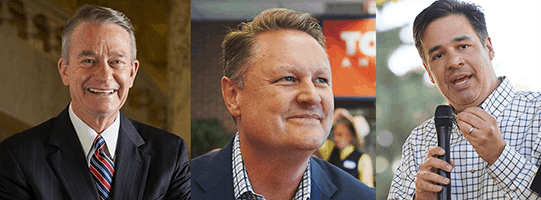


Gov. Butch Otter surprised and disappointed many when he vetoed House Bill 139, which would have allowed Idaho makeup artists to continue supplying their services and talents to brides at weddings, beauty contestants at pageants and actors on film sets.
But, there’s some hopeful news on the horizon: All three Republican candidates for governor say they would have supported the legislation .
Ever since Otter’s veto, makeup artists who aren’t licensed or who operate at a location away from a licensed salon have been put out of business or forced to operate in the shadows, away from the prying eyes of government investigators who are surveilling for, no kidding, illegal makeup application. Gone, too, are unlicensed curling iron businesses, which the Board of Cosmetology shut down after its investigators discovered illicit curling iron demonstrations. The bill Otter vetoed would have excused such businesses from government regulation.
Candidate Tommy Ahlquist said were he governor, the bill would be law today: “Yes, I would have signed the bill. It reduces unnecessary regulatory burdens and makes it easier for small businesses to thrive. We need to let free market competition work."
Raul Labrador said he also would have signed the measure, and added that his administration would focus on eliminating government barriers to productivity: “What we need is for the government to get out of the way and let good ideas flourish in the free market. Idaho should be a place that embraces, not shuns, creative, productive people. Unleashing the full potential of the people of Idaho will be my number one priority as governor.”
Lt. Gov. Brad Little wasn’t as direct as Ahlquist or Labrador in indicating how he would have acted on House Bill 139. Rather, he said, “I would have worked with the bill sponsors and stakeholders to ensure a veto was not necessary on H139. The bill had many good components.” Little didn’t criticize Otter’s veto, but he hit on a point that has long frustrated the bill’s supporters, who said they didn’t hear objections from Otter nor were they approached to address concerns before it landed on the governor’s desk. Had that happened, more makeup artists might still be in business because a veto would have been avoided, as Little observed.
Little also touts his executive order, signed in May when he was acting governor, that asks agencies and the public to aid in evaluating the impact of occupational licensure on state residents.
The Republican primary is less than a year away, and the general election is around 480 days from now. No Democrat has yet to announce for the contest. Still, so far, the initial rhetoric and the promises coming out of the candidates for governor are decidedly free market oriented.
The questions get harder from here. However, for now Ahlquist, Labrador and Little are making the right commitments, and that could mean a reversal of the policies that have long adversely impacted Idaho businesses that have been stymied or shuttered by the state government’s overzealous regulation during the Otter years.


